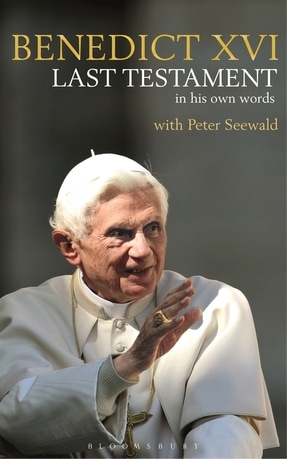
I used to think this simple flattery, but perhaps there is a certain truth to it. They say I'm young not so much because, at 55 years, I'm relatively younger than them, but because I am still working on projects, such as building perpetual adoration or developing a spirituality of Christian stewardship. I project a certain energy because neither God nor the archbishop have asked me to retire yet.
I'm reading Peter Seewald's new interview of Joseph Ratzinger, Benedict XI: Last Testament. It's a charming conversion with an old man who has indeed retired. One hears a striking change in the Pope's voice from his earlier interviews. He is no longer responsible for expressing a definite opinion; he is more in the mode of reflective gratitude for what has passed than in active engagement of what may yet be. Benedict is an old man because he has finished his life's work. When asked about his discovery of the "new theology" in the 1950s, he laughs a little and says "well, when you are young you linger over doing something, then you think you can manage it. I wasn't familiar with complexity...but I thought: we are young people, we have a point of entry. From this certainty that we are able to build the world anew, I was fearless before great things."
What defines "young" or "old?" Years, of course, but all of us have known 80-year-olds that seem younger than 40-year-olds. More defining than chronological age is whether we still have a work to do. I have much work before me still. Only God knows how it will turn out but He has not yet indicated that I retire. Mother Teresa "retired" to some degree in the spring of 1997 when she stepped down as superior general of her order, and many remarked how she became "older" but in a charming childlike simplicity.
It is this profound simplicity that I sense in Pope Benedict now. He is "old" in that he has become a child again, awaiting his birth into a new life. It is the simple trust of God's Son who said at the end of his life "it is finished." To retire from life's great work, to become an old man or woman by leaving it to younger people, is sad only for one who mistakenly thinks that he is indispensable.
Reading the Sayings of the Desert Fathers for the first time, I realized that the goal of any youth was to become an old man. An old man finally has the capacity to trust that, in the end, all will be well, may all manner of things will be well. He finally believes in God more than himself. This is the delightful portrait we get of Joseph Ratzinger now, at the end of his life. It's a good book.


 RSS Feed
RSS Feed